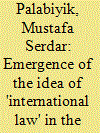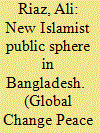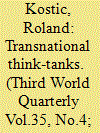| Srl | Item |
| 1 |
ID:
128220


|
|
|
|
|
| Publication |
2014.
|
| Summary/Abstract |
The literature on the Ottoman Empire's position in the European states system generally considers the Treaty of Paris as a landmark event for the European states' recognition of the Ottoman participation in the European concert and the advantages of European international law. This article argues that this consideration overestimates the impact of the Treaty of Paris and reveals that before 1856, the Ottoman Empire was a part of the European states system and was subject to European international law both in terms of treaty-making practices and in the utilization of European customary law. Moreover, the article argues that the Ottomans were interested in the concept of international law before the Treaty of Paris. The existence of archival documents on Ottoman dealings with the European states and the publication of two translations from the European international law treatises before the Treaty of Paris indicate that the Ottomans interest in international law was to ensure the survival of the empire.
|
|
|
|
|
|
|
|
|
|
|
|
|
|
|
|
| 2 |
ID:
125047


|
|
|
|
|
| Publication |
2013.
|
| Summary/Abstract |
Historically, Bangladesh has a strong and culturally embedded vibrant public sphere. The Bangladeshi public sphere always consists of a multiplicity of publics. The idea of public sphere in Bangladesh was based on the idea of secular rationality or religious neutrality. However, the situation is changing; attempts are being made to create an Islamist public sphere. This paper highlights two examples of this effort to foster the Islamization of the public sphere: production of Islamist fiction and founding women's discussion groups. It argues that the emerging Islamist public sphere in Bangladesh only subscribes to one interpretation of Islam and that the traditional authorities are now being replaced by the Islamist interpretation advanced by ideologues. It further argues that the absence of reference to local syncretistic traditions in the new Islamist discourse makes its authenticity suspect.
|
|
|
|
|
|
|
|
|
|
|
|
|
|
|
|
| 3 |
ID:
173239


|
|
|
|
|
| Summary/Abstract |
There are very few scholarly endeavors that have focused on Pakistan–India partition and their ongoing conflict from an indigenous theoretical lens. A psycho-cultural paradigm has been used in this article to reexamine and reconceptualize the enduring two-Nations theory – a political ideology, which manifests Hindu-Muslim discord in the Indian Subcontinent by construing both communities as distinct nations based on their inherent ethno-religious and civilizational differences. Considering a very complex process of mass conversion, assimilation, and crisscrossing of caste-system between both groups, this article argues that it is theoretically problematic to differentiate between Hindus and Muslims purely on ethno-religious grounds. Given the significant impact of the institution of family on the lives of the Subcontinental people, regardless of their faith – I propose that it can be more explanatory to categorize both groups as competing branches of a joint family, to understand the construction of political ideology of two-Nations theory in familial terms. This article seeks to clarify the theoretical mechanism through which the family-level ideas can shape peoples’ worldview, informing the way they perceive abstract concepts such as group-conflict and the nation, thus impacting their political thoughts.
|
|
|
|
|
|
|
|
|
|
|
|
|
|
|
|
| 4 |
ID:
133259


|
|
|
|
|
| Publication |
2014.
|
| Summary/Abstract |
Peace-building situations can be described as battlefields of ideas where key international policy makers engage in internal battles for control over intervention policy. Knowledge production, based on timely information and analysis, is seen as crucial to winning these battles of ideas. By providing detailed information, analysis and recommendations, the International Crisis Group (icg) has assumed an important role in this process. Yet we know little about the specific role the icg plays in battles for intervention policy. This article investigates icg analyses and recommendations and the way they fit into the specific internal debates within the international community in Bosnia and Herzegovina (BiH) in 2000-01. By looking at the work of the icg in BiH around the elections in 2000, the article demonstrates that it often acted as a legitimising agent of US positions and policy in the country.
|
|
|
|
|
|
|
|
|
|
|
|
|
|
|
|